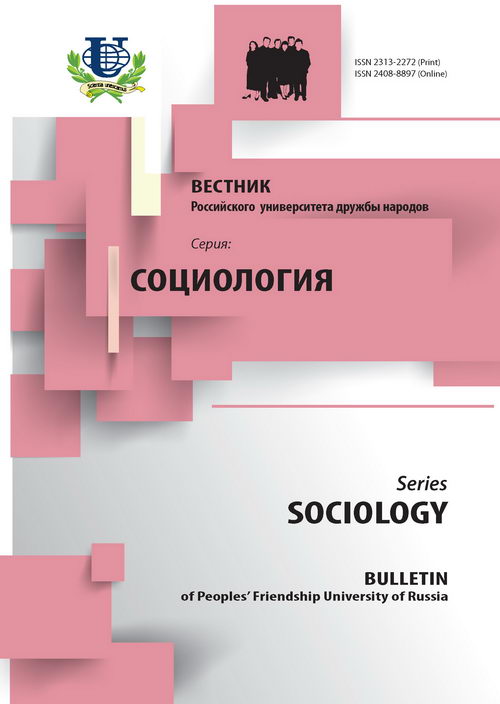Social Aspects of Internet Communication: Virtual Community and Communication Personality
- Authors: Maximova OB1
-
Affiliations:
- Peoples' Friendship University of Russia
- Issue: No 1 (2011)
- Pages: 24-33
- Section: Articles
- URL: https://journals.rudn.ru/sociology/article/view/6291
- ID: 6291
Cite item
Full Text
Abstract
The new global communication medium gives rise to a new type of discourse that exerts considerable influence on communication practices. The article touches upon the most typical features of Internet communication, while special emphasis is paid to its role in self-identification. The author comes to the conclusion that the virtual medium fosters the development of peculiar communication and cognitive skills which turn out to be indispensable for adequate and efficient Internet communication. Thus, the competence in Internet communication becomes the primary basis for social status ascription in the stratification structure of virtual community.
About the authors
O B Maximova
Peoples' Friendship University of Russia
Author for correspondence.
Email: maximovaob@mail.ru
Кафедра социологии; Российский университет дружбы народов; Peoples' Friendship University of Russia
References
- Byun S., Ruffini C., Mills J.E. et al. Internet Addiction: Metasynthesis of 1996-2006 Quantitative Research // CyberPsychology and Behavior. - 2009. - V. 12. - № 2. - P. 203-207.
- Castells M. The Rise of the Network Society. The Information Age: Economy, Society and Culture. - Vol. I. - Cambridge, MA; Oxford, UK: Blackwell, 1996.
- Crystal D. Johnson and the Internet // Hilda Hulme Memorial Lecture, University of London, 21 April. - 2005. - URL: http://www.davidcrystal.com/David_Crystal/internet.htm (data obrashcheniya 27.11.2010)
- Crystal D. Language and the Internet. - Cambridge: Cambridge University Press, 2006.
- Crystal D. The Language Revolution. - Malden, MA: Polity Press, 2004.
- Jaffe J.M., Lee Y., Huang L., Oshagan H. Gender, Pseudonyms and CMC: Masking Identities and Baring Souls // 45th Annual Conference of the ISA. - 1995. - URL: http://research.haifa.ac.il/~jmjaffe/genderpseudocmc/gender.html (data obrashcheniya 27.11.2010)
- Jones S.G. Understanding Community in the Information Age / in S.G. Jones (ed.), Cybersociety: Computer-Mediated Communication and Community. - Thousand Oaks, CA: Sage Publications Inc., 1995. - P. 10-35.
- Jones S., Fox S. Generations Online in 2009 // Pew Internet & American Life Project. - January 28, 2009. - URL: http://www.pewinternet.org/Reports/2009/Generations-Online-in-2009.aspx (data obrashcheniya 27.11.2010)
- McLuhan M. Understanding Media. The Extensions of Man. - McGraw Hill, NY, 1994.
- Nelson T. Literary Machines. - Sausalito, CA: Mindful Press, 1993.
- Batygin G.S. Sotsiologiya Internet: Nauka i obrazovanie v virtual'nom prostranstve // Sotsiologicheskii zhurnal. - 2001. - № 1.
- Galichkina E.N. Spetsifika komp'yuternogo diskursa na angliiskom i russkom yazykakh: Diss. ... kand. filol. nauk. - Astrakhan', 2001.
- Goroshko E.I. Internet-zhanr i funktsionirovanie yazyka v Internete: popytka refleksii // Zhanry rechi. - Vyp. 6 «Zhanr i yazyk». - Saratov: Nauka, 2009.
- Internet v Rossii // Fond Obshchestvennogo Mneniya / Regulyarnyi byulleten'. - 2010 - Vypusk № 28. - URL: http://bd.fom.ru/report/cat/smi/smi_int/zima2009_10 (data obrashcheniya 27.11.2010)
- Internet v Rossii: tempy proniknoveniya i tipy ispol'zovaniya // VTsIOM. - 06.04.2010. - Press-vypusk № 1466. - URL: http://wciom.ru/index.php?id=268&uid=13386 (data obrashcheniya 27.11.2010)
- Krasnykh V.V. Virtual'naya real'nost' ili real'naya virtual'nost'? (Chelovek. Soznanie. Kommunikatsiya). - M.: Dialog-MGU, 1998.
- Konetskaya V.P. Sotsiologiya kommunikatsii: Uchebnik. - M.: Mezhdunarodnyi universitet biznesa i upravleniya, 1997.
- Tarasenko V.V. Antropologiya Internet: samoorganizatsiya «cheloveka klikayushchego» // Obshchestvennye nauki i sovremennost'. - 2000. - № 5.
Supplementary files













